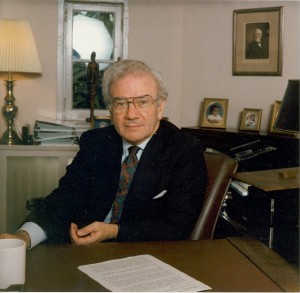by Cynthia A. Wells
The common good is a conceptual thread that runs through the fabric of Ernest Boyer’s work. As one early example, Boyer and Marty Kaplan argued in 1977 that education’s revelatory capacity to extend an understanding of shared humanity to a citizenry with widely varied roots is critical to the social survival of U.S. society.[1] In 1988, Boyer contended that colleges should “expect students to go beyond their private interests, learn about the world around them, develop a sense of civic and social responsibility, and discover how they can contribute to the common good.”[2] As part of his final project, he articulated in 1995 that the ultimate aim for elementary school renewal is “not just to build a better school, but, above all, to build a better world for our children.”[3] The common good was a vital concern that not only permeated but also animated Boyer’s work.
Given Boyer’s deeply attentiveness to the queries of purpose[4], it is no surprise that he understood the common good to mean an aspirational intention for all of education. From his perspective, the common good is not a description of a thing but rather the name of a value, a commitment to a shared stake in a world we hold in common and on whose well-being we all depend. This commitment undergirds the more specific proposals embedded in Boyer’s rich body of work, whether a commitment to common learning, a broader view of scholarship, or a desire to renew K-12 education or to nurture community in the college. He genuinely believed that educational institutions benefitted not only individuals but also existed for the good of society.
It is this essential commitment that makes the notion of the common good both timeless and timely. Advancing the common good continues to offer an aspirational vision that potentiates generative responses to many of the disquieting concerns facing education today. Loss of public trust and declining financial investment as well as questions of curriculum renewal, access and equity, and educator quality are just a few of the current concerns that may be generatively addressed by grounding our analyses and proposals for change in terms of connection to the common good. We would do well today to be mindful that our fates as individuals are inextricably intertwined and that recognizing our shared humanity amid our rich diversity is crucial to our shared future. To honor and extend Boyer’s legacy, let us consider the common good as not only an aspirational vision but also an educational imperative.
NOTES:
[1] Ernest L. Boyer and Martin Kaplan, Educating for Survival (New Rochelle, NY: Change Magazine Press, 1977). Marty Kaplan served as a collaborative partner for Ernie for many years, including staffing a workshop for Ernie at the Aspen Institute and being his executive assistant when Ernie served as U.S. Commissioner of Education. Kaplan now serves as the Norman Lear Chair in Entertainment, Media, and Society at the University of Southern California’s Annenberg School of Communication and Journalism.
[2] Ernest L. Boyer, “A College of Quality,” in Ernest L. Boyer: Selected Speeches 1979-1995 (New Jersey: Carnegie Foundation for the Advancement of Teaching, 1997), 58. Speech delivered at the annual meeting of the Association of American Colleges in 1988.
[3] Ernest L. Boyer, The Basic School: A Community for Learning (San Francisco, CA: Jossey Bass, 1995), 12.
[4] Marty Kaplan, “Education for the Common Good,” in Todd C. Ream and John M. Braxton, Ernest L. Boyer: Hope for Today’s Universities (Albany, NY, SUNY Press, 2015), 253-260.

